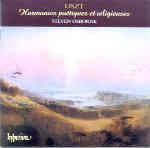Harmonies Poétiques et religieuses, Franz Liszt’s cycle of religiously inspired pieces, underwent numerous transformations before arriving at its definitive form when it was first published in 1853. Although Liszt thought highly of these works and often performed them for friends long after he abandoned regular concert-giving, only the Funérailles and the Bénédiction de Dieu dans la solitude have survived in the “standard” piano recital repertoire. Whether or not Steven Osborne’s advocacy will create new audiences for the cycle as an entity in itself, he certainly makes a case as straightforward, untrammeled, and scrupulously prepared as we’re likely to receive on disc.
His dynamic range, ear for textural variety, and technical aplomb surpass Leslie Howard’s recordings for Hyperion’s complete Liszt edition. Introspective passages in the pieces derived from vocal works (the Ave Maria, Pater Noster, and Hyme de l’Enfant à son réveil) are eloquently sustained and seemingly bypass the piano’s hammers. At the same time, passages demanding the utmost in outward virtuosity (Funérailles’ pulverizing central octaves, or the swarming arpeggio waves in Miserere d’après Palestrina) benefit from Osborne’s controlled fire.
Among complete cycles, some listeners may gravitate toward Philip Thomson’s wider berth of tempo fluctuation and more massive sonority, despite Naxos’ clangy sonics. In Thomson’s hands, for example, Invocation’s grandiose opening pages make a fuller-throated, more elemental effect, and the Benediction’s right-hand double notes sing more via Thomson’s spacious inflection. Individual recordings also offer alternative perspectives. In the relatively unknown (and unjustly neglected) Andante lagrimoso and Pensée des morts, Sviatoslav Richter’s magical legato and gorgeous, transparent touch still linger in the ear (that is, if you can find his out-of-print Philips recordings), while Claudio Arrau’s luminous, probing Benediction remains this work’s standard-bearer. None of this, I hasten to add, should pull focus from Osborne’s mastery and genuine affection for a body of work that easily can sound shallow and boring in the wrong hands. Excellent engineering and annotations support my overall recommendation.
































